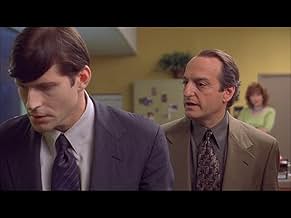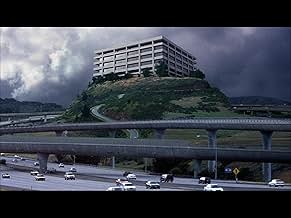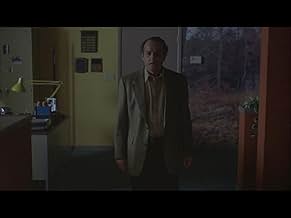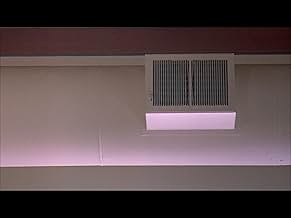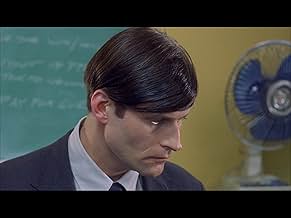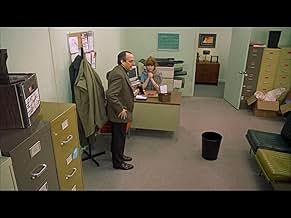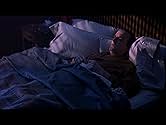IMDb RATING
6.4/10
2.3K
YOUR RATING
A clueless boss has no idea what to do with his mundane office worker whose refusal of duties only gets worse each passing minute.A clueless boss has no idea what to do with his mundane office worker whose refusal of duties only gets worse each passing minute.A clueless boss has no idea what to do with his mundane office worker whose refusal of duties only gets worse each passing minute.
- Director
- Writers
- Stars
- Awards
- 1 nomination total
Stu Klitsner
- Professor Bum
- (as Stuart Klitsner)
Catherine DiNapoli
- Rocky's Girlfriend
- (as Catherine di Napoli)
- Director
- Writers
- All cast & crew
- Production, box office & more at IMDbPro
Featured reviews
7B24
The film touches on some parts of the original story very aptly. I thought the Chaykin-Piscopo match was very close indeed to what Melville intended. As to Crispin Glover, no other movie actor of his stature is creepy enough and palpably slow-witted enough to fit the role -- not even the younger editions of a Brando or Hopper or Walken, who would overact monstrously in one form or another.
Most viewers seem to surrender to the misconception that the story is all about Bartleby. In fact, the narrator undergoes the most profound change within its context. And in that sense this film version fails because the Paymer character is made out to be a complete sap, rather than the seriously introspective and well-educated man of the original.
No one in 1853 knew anything of co-dependency in relation to addictions and other mental disorders, but Melville was prescient in that regard. The apparent despondency of Bartleby (characterized in the original as late of the Dead Letter Office) has no bounds, but it is in his employer's character we are led to see that this relatively new concept involving an excess of identification with the subject person can result in similar debilitation on the part of the caregiver.
It falls as well into the category of feature-length films based on short stories destroyed by too much padding and extraneous activity we used to call "stage business." It should be as spare as the slowly emptying mind of Bartleby himself.
Most viewers seem to surrender to the misconception that the story is all about Bartleby. In fact, the narrator undergoes the most profound change within its context. And in that sense this film version fails because the Paymer character is made out to be a complete sap, rather than the seriously introspective and well-educated man of the original.
No one in 1853 knew anything of co-dependency in relation to addictions and other mental disorders, but Melville was prescient in that regard. The apparent despondency of Bartleby (characterized in the original as late of the Dead Letter Office) has no bounds, but it is in his employer's character we are led to see that this relatively new concept involving an excess of identification with the subject person can result in similar debilitation on the part of the caregiver.
It falls as well into the category of feature-length films based on short stories destroyed by too much padding and extraneous activity we used to call "stage business." It should be as spare as the slowly emptying mind of Bartleby himself.
Ordinarily when the industry tries to turn a short story like Melville's "Bartleby the Scrivener" (which I haven't read since high school) into a "major motion picture," you can forget about it. The kiss of death. You want to see an example, watch Hollywood's version of "The Snows of Kilimanjaro" sometime, especially the scene in which Gregory Peck receives a message -- that famous floating pregnant italicized first paragraph of Hemingway's -- and reads it aloud between guffaws in a smokey saloon midway through the film.
I wasn't expecting much from this movie either. It has less action than Hemingway so I was prepared to switch channels on impulse. But I was surprised because it turned out to be very well done. Melville is often cited as a forbear of Kafka but I don't know how well deserved that description is. The fact is that after Melville and before Kafka there was an enormous interest in bureaucratization, the "rationality" of labor as Max Weber referred to it. It was the period in which small craftsmen were being replaced by the kind of gigantic corporations that "alienated" the worker. Henry Ford adopted Jackson's "assembly line" methods and -- well, you get the picture. Bureaucracy, as a social problem and as a literary subject, was in the air. Anyway there's a little touch of Ionesco in here too, in addition to Kafka.
Wardrobe is great. Everyone's dress reflects his or her personality but not in any obvious way. Art direction is equally well done. The acting could hardly be improved upon and the script is surprisingly well joined. The latter two points are important because this is hardly more than a staged play and is very dependent on those aspects of production. And, oh, I have to mention the score too. Most of the music is a tinkling solo piano straight out of a silent movie. The rest is most queerly orchestrated: percussion, piano, bowed bass, theramin, trombone and vibes. (It's as if someone had thrown the name of every possible instrument into a hat including the glockenspiel and drawn out half a dozen at random.)
There isn't space enough to get into the rewards this film offers but let me mention two anyway. The performances are fine, but Glenn Headly is outstanding with her hooded eyelids and her gaze which seems to drop unzippingly down a man's body when she speaks to him. Her voice is sultry, mellifluous, insinuating. And her posture! Well, it's easy to get laughs out of a funny walk. Monty Python built a sketch around the idea. But Headly's BELONGS to her character. Her pelvis and belly are thrust forward, her shoulders drawn back, a Venus of Willendorf minus two hundred and fifty pounds.
The script -- except for an overblown plea for something called "humanity" at the end -- is not only engrossing but at times extremely funny if it's listened to. (The director doesn't shove the comedy down your throat.) After Bartleby refuses to work anymore by simply saying, "I prefer not to," half a dozen times, the other three office workers pick up on the word and begin using it unthinkingly. "Would you prefer coffee or tea?" "Your wife is on line three, or line two if you'd prefer." It begins to drive the boss mad. Another line: "Business Park! What kind of address is that? Those two words should never be used together. There's a word for people who do that. Oxymorons." And a delapidated old drunken bum stops the boss on a street and asks him, "Pardon me. Do you happen to have an extra dollar and thirteen cents? I was just xeroxing my dissertation --"
Melville's symbolism could get a bit thin -- the lightening rod salesman -- but Bartleby is more like the white whale. And I hate to say this because I'm sure Meville wouldn't have said it but there's a certain concordance between "Moby Dick" and "Bartleby. Both contrast the instrumental aspect of capitalism (the records room boss and the crew of the Pequod) with a stubborn and apparently spiritless self dermination (Bartleby and Ahab). As for the whale, I frankly don't know what he stands for unless it's the unknowable itself.
This film is really pretty good.
I wasn't expecting much from this movie either. It has less action than Hemingway so I was prepared to switch channels on impulse. But I was surprised because it turned out to be very well done. Melville is often cited as a forbear of Kafka but I don't know how well deserved that description is. The fact is that after Melville and before Kafka there was an enormous interest in bureaucratization, the "rationality" of labor as Max Weber referred to it. It was the period in which small craftsmen were being replaced by the kind of gigantic corporations that "alienated" the worker. Henry Ford adopted Jackson's "assembly line" methods and -- well, you get the picture. Bureaucracy, as a social problem and as a literary subject, was in the air. Anyway there's a little touch of Ionesco in here too, in addition to Kafka.
Wardrobe is great. Everyone's dress reflects his or her personality but not in any obvious way. Art direction is equally well done. The acting could hardly be improved upon and the script is surprisingly well joined. The latter two points are important because this is hardly more than a staged play and is very dependent on those aspects of production. And, oh, I have to mention the score too. Most of the music is a tinkling solo piano straight out of a silent movie. The rest is most queerly orchestrated: percussion, piano, bowed bass, theramin, trombone and vibes. (It's as if someone had thrown the name of every possible instrument into a hat including the glockenspiel and drawn out half a dozen at random.)
There isn't space enough to get into the rewards this film offers but let me mention two anyway. The performances are fine, but Glenn Headly is outstanding with her hooded eyelids and her gaze which seems to drop unzippingly down a man's body when she speaks to him. Her voice is sultry, mellifluous, insinuating. And her posture! Well, it's easy to get laughs out of a funny walk. Monty Python built a sketch around the idea. But Headly's BELONGS to her character. Her pelvis and belly are thrust forward, her shoulders drawn back, a Venus of Willendorf minus two hundred and fifty pounds.
The script -- except for an overblown plea for something called "humanity" at the end -- is not only engrossing but at times extremely funny if it's listened to. (The director doesn't shove the comedy down your throat.) After Bartleby refuses to work anymore by simply saying, "I prefer not to," half a dozen times, the other three office workers pick up on the word and begin using it unthinkingly. "Would you prefer coffee or tea?" "Your wife is on line three, or line two if you'd prefer." It begins to drive the boss mad. Another line: "Business Park! What kind of address is that? Those two words should never be used together. There's a word for people who do that. Oxymorons." And a delapidated old drunken bum stops the boss on a street and asks him, "Pardon me. Do you happen to have an extra dollar and thirteen cents? I was just xeroxing my dissertation --"
Melville's symbolism could get a bit thin -- the lightening rod salesman -- but Bartleby is more like the white whale. And I hate to say this because I'm sure Meville wouldn't have said it but there's a certain concordance between "Moby Dick" and "Bartleby. Both contrast the instrumental aspect of capitalism (the records room boss and the crew of the Pequod) with a stubborn and apparently spiritless self dermination (Bartleby and Ahab). As for the whale, I frankly don't know what he stands for unless it's the unknowable itself.
This film is really pretty good.
My first reaction to "Bartleby" is that this movie is much like a previous Crispin Glover effort, "Rubin and Ed" about a strange, directionless man with little background, who plods his way through life carelessly. Some of the awkward moments and surreal dialogue and movements within Bartleby seem to be forced, trying to hard, to capture a campy feel. The film doesn't quite reach a campy status though because of this. Although Glover captures his quirky behavior perfectly, from staring at the air vent for hours, to endlessly saying "I prefer not to.." to every work request, and the dynamics of the working relationship with his boss are interesting at times. Joe Piscopo and Maury Chaykin have some strange roles as co-workers who are up to no good... how these guys stay employed are a mystery.
Bartleby has two major problems. One is, it just gets boring. A good slow movie can do and say a lot, but Bartleby just seems to be obsessed more with how weird it can be, how far it can push the surrealism of its cast and the corporate buildings on the hills. Another thing is, why does Bartleby's boss take such an interest in him? What is the motivation? Perhaps this is best explained in Herman Melville's book, from which this movie is based. For a Crispin Glover fan, this is even barely worth watching.
Bartleby has two major problems. One is, it just gets boring. A good slow movie can do and say a lot, but Bartleby just seems to be obsessed more with how weird it can be, how far it can push the surrealism of its cast and the corporate buildings on the hills. Another thing is, why does Bartleby's boss take such an interest in him? What is the motivation? Perhaps this is best explained in Herman Melville's book, from which this movie is based. For a Crispin Glover fan, this is even barely worth watching.
The head of a public records office advertises for a new employee. Only one person responds--Bartleby, a former postal worker who at first files like a demon then lapses into apathy. Bartleby stands all day looking at an air vent in the ceiling, responding to every request from his boss and coworkers with, "I would prefer not to." Eventually the boss retaliates with passive-aggressive acts aimed at getting rid of the man. Till the very end, however, Bartleby remains an enigma, a human cipher who refuses to give up his secrets.
Hardly an engaging story premise? That's what I thought when I trudged through Herman Melville's mid-nineteenth century story "Bartleby the Scrivener" in college lit class. Sure, the story has an important theme and some interesting symbolism, but it's also dull, dull, dull. However, director Jonathan Parker has taken the best sort of revenge on this canonical work of American literature; he's turned it into a zany, low-budget, laugh fest--getting across many of the essential ideas while also entertaining his audience. Parker has approached the sort of exaggerated, stale, depressing office atmosphere seen at the beginning of "Joe Versus the Volcano" and turned it inside out, covering it with a colorful, kitschy facade to inflate the absurdity of modern information mills.
Essential to the success of the film is the fine ensemble cast. Crispin Glover deserves more lead roles, and though with Bartleby he does spend most of his time immobile and silent, perhaps no other actor can accomplish more with simple posture, well-manipulated expressions, and quirky movement. Glenne Headly is a scream in her exaggerated seduction attempts aimed at Seymour Cassel. Joe Piscopo is also in fine form as the office macho man, though he has aged dramatically since we saw him last in, what--"Wise Guys"? Maury Chaykin gives the overweight and nerve-racked Ernie a comic flair, playing with his desktop windup toys only to flinch every time they jump, and pulling off an impressive physical comedy scene involving a sandwich, a photocopier, and a watercooler. Finally, David Paymer as "The Boss" provides a solid focus for the film with his adaptive performance of a complex character.
Hardly an engaging story premise? That's what I thought when I trudged through Herman Melville's mid-nineteenth century story "Bartleby the Scrivener" in college lit class. Sure, the story has an important theme and some interesting symbolism, but it's also dull, dull, dull. However, director Jonathan Parker has taken the best sort of revenge on this canonical work of American literature; he's turned it into a zany, low-budget, laugh fest--getting across many of the essential ideas while also entertaining his audience. Parker has approached the sort of exaggerated, stale, depressing office atmosphere seen at the beginning of "Joe Versus the Volcano" and turned it inside out, covering it with a colorful, kitschy facade to inflate the absurdity of modern information mills.
Essential to the success of the film is the fine ensemble cast. Crispin Glover deserves more lead roles, and though with Bartleby he does spend most of his time immobile and silent, perhaps no other actor can accomplish more with simple posture, well-manipulated expressions, and quirky movement. Glenne Headly is a scream in her exaggerated seduction attempts aimed at Seymour Cassel. Joe Piscopo is also in fine form as the office macho man, though he has aged dramatically since we saw him last in, what--"Wise Guys"? Maury Chaykin gives the overweight and nerve-racked Ernie a comic flair, playing with his desktop windup toys only to flinch every time they jump, and pulling off an impressive physical comedy scene involving a sandwich, a photocopier, and a watercooler. Finally, David Paymer as "The Boss" provides a solid focus for the film with his adaptive performance of a complex character.
Herman Melville's short story "Bartleby the Scrivener" gets a slightly surreal update in this offbeat comedy drama. The manager (David Paymer) of the city records department in a mid-sized California community decides that his staff of three - flirty chatterbox Vivian (Glenne Headly), sloppy Vietnam vet Ernie (Maury Chaykin), and slick-suited, Don Juan wannabe Rocky (Joe Piscopo) - could use some help, so he places an ad looking for a new employee. The boss ends up hiring the one and only applicant who wants the position, a quiet, pale young man named Bartleby (Crispin Glover).
At first, Bartleby is a model of efficiency, but before long he loses enthusiasm for his job, much to the annoyance of his co-workers, and soon he's spending his days staring at an air conditioning vent. The Boss asks Bartleby to get back to work, but Bartleby's repeated reply to such requests is, "I prefer not to," and the Boss sees little recourse but to fire him.
However, Bartleby refuses to leave his desk, and it soon becomes obvious that Bartleby has not only stopped doing his work - he's stopped going home and has moved into the office. Bartleby was the first feature film for producer/director Parker. He also wrote the screenplay, in collaboration with Catherine Di Napoli.
There is really not enough material in Melville's story to warrant a feature length film. When "Bartleby" sticks to the text of the story it is interesting and fairly funny, but Parker is forced to add a lot of filler which is simply not very good. Worth a look, but in the end, a bit weak.
At first, Bartleby is a model of efficiency, but before long he loses enthusiasm for his job, much to the annoyance of his co-workers, and soon he's spending his days staring at an air conditioning vent. The Boss asks Bartleby to get back to work, but Bartleby's repeated reply to such requests is, "I prefer not to," and the Boss sees little recourse but to fire him.
However, Bartleby refuses to leave his desk, and it soon becomes obvious that Bartleby has not only stopped doing his work - he's stopped going home and has moved into the office. Bartleby was the first feature film for producer/director Parker. He also wrote the screenplay, in collaboration with Catherine Di Napoli.
There is really not enough material in Melville's story to warrant a feature length film. When "Bartleby" sticks to the text of the story it is interesting and fairly funny, but Parker is forced to add a lot of filler which is simply not very good. Worth a look, but in the end, a bit weak.
Did you know
- TriviaDick Martin's final acting performance.
- GoofsWhen "The Boss" goes to check out a new place for their office, he settles on a place with no electrical outlets on 3 of the walls. (The 4th wall is not shown) There's a Xerox and every desk has a computer. This arrangement would be completely unacceptable for any office manager.
- Crazy creditsBefore the opening credits begin, viewers are given a portrait and short biography of Herman Melville, upon whose story the film is loosely based.
- ConnectionsReferenced in Stargate: Atlantis: The Lost Boys (2005)
- SoundtracksPhantasie #3 In D Minor
Written by Wolfgang Amadeus Mozart (as Mozart)
Background music on piano by Nancy Spottiswoode
- How long is Bartleby?Powered by Alexa
Details
- Release date
- Country of origin
- Official site
- Language
- Also known as
- Bartleby at the Office
- Filming locations
- Production company
- See more company credits at IMDbPro
Box office
- Gross US & Canada
- $148,479
- Opening weekend US & Canada
- $14,599
- May 27, 2002
- Gross worldwide
- $148,479
Contribute to this page
Suggest an edit or add missing content



